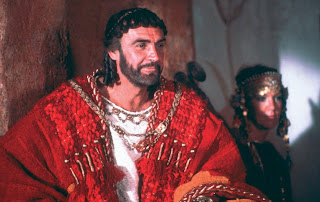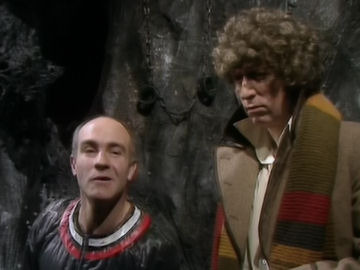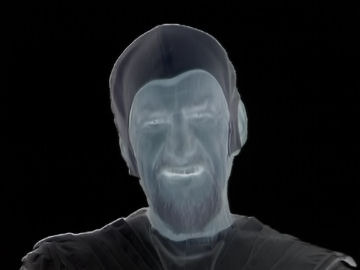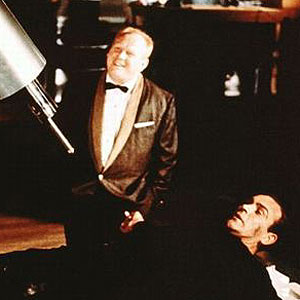 |
| Yes, he is a free man and yes, he meant to dress like that.... |
"How do you like the bounty-hunting business?"
"Kill white people and get paid for it? What's not to like?."
1) Since this is a Quentin Tarantino movie, I appreciated the way he incorporates elements from the original Franco Nero films into the story. Hell, I practically stood up in my seat when the Morricone theme (arguably the greatest movie theme of all time) came out of the speakers at the beginning, and pumped the air when Nero shows up for a brief cameo that passes the torch onto Jamie Foxx.
2) Even though Tarantino has had flirtations with other actors before, I have come to believe that he's found his muse in Christoph Waltz. Just like with his portrayal of Landa in Inglorious Basterds, Waltz' Dr. King Schultz is a vivid character who seems to have his own weird code of honor. And given how well he plays off of Foxx, he's a great characters who brightens the film as long as he's onscreen.
3) I think the real charm of Leonardo diCaprio's Candie is that while he does villainous things, an argument can be made that he may not exactly be the villain. Yes, he does some hideously awful things, he has that subtle but gross incestuous relationship with his sister...but nothing he does is outside the law or mores of the culture he exists in. It's only when Samuel L. Jackson's Stephen outs Schultz and Django that Candie becomes a monstrous individual. Taken in this context, it makes sense that his role is relatively small. And speaking of Stephen....
 |
| "You are supposed to be me? Funny...I do not look black...." |
5) God bless Tarantino for continuing to use practical effects. These wounds are splattery and messy, and doesn't have the sameness of CGI wounds in other films. This carnage is so gross that you sort of understand why Django hesitates to kill one man in front of his son.
6) I know that some people have some problems with the humorous way Tarantino handles Don Johnson's Big Daddy and his proto-Klan buddies, especially the scene featuring Jonah Hill complaining about the hoods. But that humorous element was vital. There's so much grimness on either side of that sequence, especially when we start moving toward the Candie sequence, that those moments (and I'll fess up to laughing out loud at the whole discussion of whether to wear the hoods or not) are necessary to allow the audience to relieve the tension.
7) One thing that sort of niggles at me is how we never see the logical extension of what Django does at both Big Daddy's and the Candie plantations. There is so much gravitas to the way Django dispatches the overseers at Big Daddy's that I expected the slaves watching him to rise up. I can understand why the slaves wouldn't rise up at the Candie's initially--they do have Stephen manipulating them into thinking they should be good lil' slaves--but the ones at Big Daddy should be running around kicking all sort of white ass after seeing Django beat and kill their masters.
 |
| Look, Don Stroud...I know you were hot shit in the 70's, but you don't mess with Christoph Waltz.... |
8) It puzzles me why Tarantino chose Kerri Washington to play Hildy. Don't get me wrong; Washington is an excellent actress....but given how little play Hildy has in the film itself, it seems like a waste of her talents.
9) And speaking of talented actors...I am totally cool with Foxx as Django for about 95% of the film's running time. But there's about 5% where Jamie Foxx The Personality steps out of Jamie Foxx The Actor and totally subverts all the work the latter has put into making his version of Django into a living, breathing character. There are some moments where I can forgive it, like in the coda at the end, but some of the other moments in Act Two and the early parts of Act Three end up being discordant.
10) I was somewhat floored by the amount of celebrity cameos in this film; if it was made in the 70's, I could easily see it being marketed with one of those headshot lines showing all the big names in small roles in the film. But without a doubt, the most pleasurable of these cameos for me was seeing John Jarrett of Wolf Creek as an Australian mining guy who is tricked into arranging for his own death.
Overall...an excellent western in the Tarantino mode that only makes me sadder that this may be the beginning of the end of his career.
I was at the Atlas again--they've now raised the price to ten dollars for a matinee, which is almost as expensive as the regular price--and managed to avoid the sludge that is the Firstlook. What I did not avoid is the family behind me who brought both their infant child and their young son, who thought nothing of deciding to play a little Angry Birds about midway through the film; I really think there should be a parenting license in this country, don't you? Not a lot of interesting trailers, perhaps the most intriguing being the one for Scary Movie 5--not because I wanted to see it, but because I was surprised the producers took this long to tackle the found footage genre.








